Carers are individuals, family, whānau and āiga who provide care for someone close to them who needs help with everyday living because of a disability, health condition, illness or injury. Words such as “kaitiaki”, “support” or “manaakitanga” may better describe the ways a person sees caring as a natural part of what they do for the people they love in the continuation of whakapapa and connection.
Low or no data? Visit Zero Data then search for 'Healthify'. Click on our logo to return to our site and browse for free.
COVID-19: Self-care for carers
Looking after yourself when you're caring for someone with COVID
Key points about looking after yourself when you're caring for someone with COVID-19
- When you’re caring for someone with COVID, it can be very tiring and hard on your own wellbeing.
- Here are some ways to help you cope and stay well.
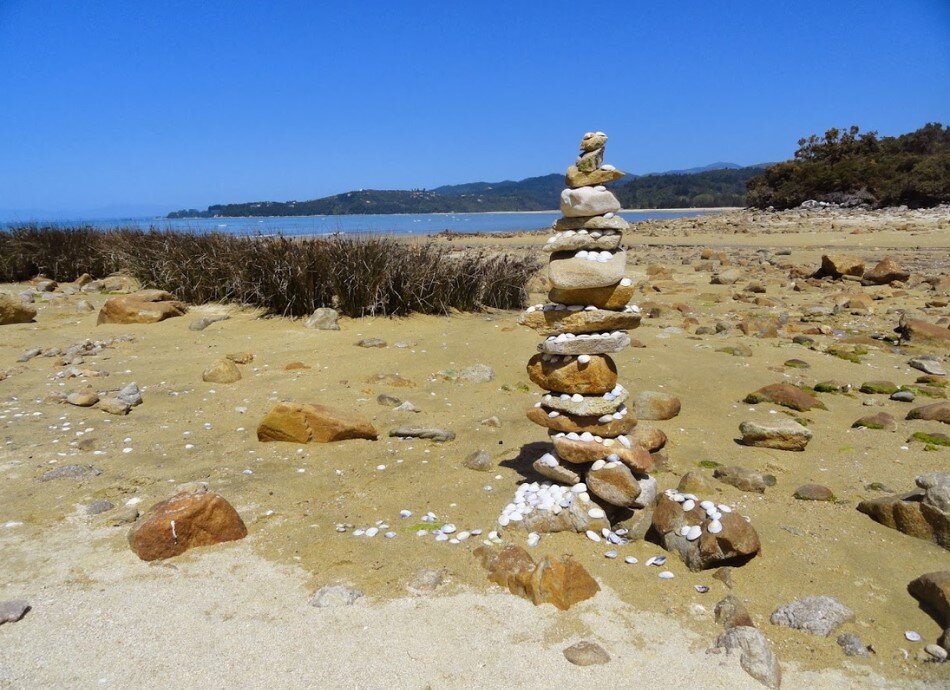
Taking care of your health and wellbeing is vital – you're health is important, too. It's not selfish to care for yourself and take some time out, because others are relying on you not to become burnt-out or unwell.
If you're a carer, you'll know caring for a sick person is physically demanding and time-consuming. You'll be busy with monitoring the person, cleaning and preparing meals as well as keeping their spirits up and keeping the rest of your commitments going. Caring for a loved one is a privilege and is rewarding, but it's not easy. The focus is all on the person needing care, but carers need care too.
Here's some tips to stay on top of things:
Eat and sleep well
Conserving your energy is important because if anyone else gets sick, you will have to start caregiving again. Prioritise your sleep and nutrition. Both will help strengthen your immune system and help you keep going. If you're up in the night looking after a sick person, try to get a rest in the day when they're asleep.
Take some exercise
Exercise when you can – even just a brief walk will help. If you can’t leave the house, exercise and find a way to relax any way you can. You could try some stretches, deep breathing, prayer or a short meditation.
Keep a daily routine
Even if you haven’t had much sleep, you'll feel better if you get up, shower and get dressed.
Stay connected
You may not be able to connect with others in person but make sure you stay connected to people using the internet or phone. Social connections are vital to wellbeing.
Seek support and accept help
If the person you are caring for doesn’t improve after about 10 days, you may need further support for yourself and for them. If someone asks if they can help, say yes. This is no time to be shy about accepting help or seeking support. You don’t have to do it all. Ask if someone can drop off a meal or get groceries. Any job you don’t have to do will give you more time and energy for looking after your loved one and yourself. This information on long COVID may be useful.
Be open about how you're feeling
Sharing your feelings will help you cope. It may not be appropriate to share how you're feeling with those you are living with, and it's not wise to burden the sick person with how you're feeling, but it's still important to talk. Please reach out to a support line if you are feeling difficult emotions like frustration and resentment. Caregiving is a very difficult job. Sharing your worries is helpful and no one will judge you. Use a support line such as 1737 (call or text), which is available 24/7.
Take mini breaks
Find a way to do something fun. It may just be dancing in the kitchen for 5 minutes or watching a funny YouTube video. Seek out easy ways to lift your spirits and take these mini breaks (5–10 minutes) throughout your day. Keep these up even when you feel overloaded.
Manage your stress
Taking care of someone with COVID is stressful. It's normal to worry, and it may impact your ability to eat, sleep and focus. It may be tempting to use alcohol, drugs or cigarettes to cope, but while you are caregiving you need to stay sober and alert to ensure you can take appropriate care of the sick person.
If you have a mental health condition, it may get worse with stress. Contact your health provider or a support line if you are worried about yourself. These tips may also help you manage your stress.
Be kind to yourself
Don’t hold yourself to an unfair standard. Perfection is impossible. Do the best job you can and limit any negative voices in your head. Speak to yourself kindly as you would speak to a friend. Hearing positive, supportive messages in your head will reduce stress and make you feel much better than listening to a stream of negativity.
Be proud of yourself. You're doing a vital service and one that you may not have chosen to do. Caregivers are important to keep our communities running.
Read more about carers and support for carers.
If somebody in your household or whare has COVID-19, you need to keep your distance from them to reduce your risk of getting sick. Even when you're the main carer, there are things you can do to reduce the chances of you catching COVID as well. You are important – if you get sick you won't be able to look after anyone.
These tips will help you get organised, take care of the sick person and look after yourself.
Get your home organised
- If possible, the person with COVID-19 should have a separate, well-ventilated room where they can sleep alone. Get creative with separate sleeping spaces. Sleep on the couch or a blow-up mattresses if you can. If sleeping alone is not possible, sleep “head to toe”.
- A separate bathroom is also ideal if it's available. If not, clean the bathroom surfaces after the sick person has used it.
- If isolating in a separate room isn’t possible, do your best to avoid sharing spaces such as the kitchen.
- Don’t share bedding, towels or eating utensils with the sick person. Give them their own separate plates and cutlery and towels to make things easier. Carefully wash them in the hottest water or setting you can.
- Get as much airflow into your home as you can. Open the windows for at least some of the day even if it is cool outside.
- Get plenty of masks and ensure that everyone who must have contact with the person with COVID-19 wears one. You may also want to ask those in shared spaces to wear a mask to limit any spread in the household.
- Cleaning is very important. Get a cleaner that is labelled “hospital grade” or use bleach so that you can clean the virus off surfaces that are touched often. You will need to do frequent wipe-downs of areas that the sick person is using and any common spaces. Don’t forget door knobs and light switches and TV remotes.
- Stock up on tissues, soap and hand sanitiser. Make sure the tissues are thrown away in lined rubbish bins.
- Use disposable gloves when you are with the person with COVID-19 if you have them.
- Wash your hands frequently and do a good job. Use soap and water on the hands for at least 20 seconds (this is long enough to sing the “happy birthday” song). Wash your hands frequently even if you use gloves. Get everyone in the whare, even those who aren’t caring for the sick person, to wash their hands carefully and frequently. If you don’t have soap and water, use hand sanitiser. Try not to touch your face.
- Reduce contact with the sick person as much as you can and be very cautious about letting anyone who is immune compromised (less able to fight infections) or has a health problem near the sick person. This includes people with chronic heart, lung or kidney conditions, and diabetes. In general, even the other healthy household members should try and see as few people as possible while they are living with someone with COVID-19.
- Cover your mouth and nose with a tissue or elbow when coughing or sneezing. Then throw away the tissue.
Get educated about how to help the person who is sick
It's important to learn about what to expect with COVID and how to help someone who is unwell. For example, there are over-the-counter medicines that can help, and positions that make breathing more comfortable. Read more about how to care for someone at home with COVID. It provides useful advice regarding what symptoms to expect, how to manage them and, most importantly, warning signs if you need to seek urgent help.
COVID is not usually an emergency, but there are signs to look out for that mean help is needed.
| Call an ambulance (111) if the person has: |
For young children, get immediate attention if the child has:
|
- Help them keep track their symptoms (signs of being sick). Keep note of any new symptoms and when they start.
- Help them stay hydrated. Provide them lots of water, hot tea or lemon drinks or any clear fluids that are not fizzy drinks or alcohol.
- Do what you can to ease their symptoms. Monitor how much paracetamol, ibuprofen or cough mixture they have and don’t let them have more than is written on the label. Keep track of what they are taking and how often.
- Read more about using paracetamol and ibuprofen and how to manage symptoms.
- Make sure they are taking any medication that they are normally supposed to take unless their doctor has specifically told them to stop.
- Provide food that is nourishing and easy to eat with a sore throat. Put the food and drink on a tray and ask the person to eat alone. Wash your hands well after touching anything they ate or drank from.
- Keep the person comfortable and entertained from a distance. Keep a phone and charger by their bed so they can get in touch immediately if they need you.
COVID-19 – family, whānau and āiga carers(external link) Health New Zealand | Te Whatu Ora
NZCarers NZ(external link) provides a hub for ideas, guidance, learning and support. They also have a Facebook page(external link)
Care Matters(external link) provides online resources, face-to-face workshop information and care planning
Information for carers(external link) Ministry of Social Development, NZ
Carer support and respite(external link) Whaikaha Ministry of Disabled People, NZ
Te uru hei kaitiaki(external link) – becoming a caregiver POI Project, NZ (Māori/English)
Toe aso mulimuli o le soifuaga – mālamalama i le mea ‘ua tupu(external link) – becoming a caregiver POI Project, NZ (Samoan/English)
Ko ‘ete hoko ko ha tokotaha tauhi(external link) – becoming a caregiver POI Project, NZ (Tongan/English)
Families, whānau and carers in NZ(external link) Age Concern NZ
Useful things to get you through COVID-19(external link) WeCare Kiwi, NZ
Caregiving basics(external link) Caregiver Action Network, US
COVID-19 positive – symptoms and when to get help [PDF, 151 KB] Healthify He Puna Waiora, 2021
COVID-19 positive – how to manage your symptoms [PDF, 135 KB] Healthify He Puna Waiora, 2021
COVID-19 positive – what symptoms can I expect? [PDF, 203 KB] Healthify He Puna Waiora, 2021
Apps reviewed by Healthify
You may find it useful to look at some Carer support apps and Mental health and wellbeing apps.
Video: Leilani's story - Finding "me time" key when caring for others during the pandemic
This video may take a few moments to load.
(Healthify He Puna Waiora and Health New Zealand | Te Whatu Ora, Waitematā, 2022)
View descriptive transcript
View transcript in Cook Islands Māori
View transcript in Niuean
View transcript in Tokelauan
During the COVID-19 pandemic, Māngere resident Leilani Hoyt would jump in the car and drive to her favourite spot by the sea, read a book or go for a walk to look after her own wellbeing.
Like many others in Auckland during the pandemic, 50-year-old Leilani was caring for her family, who have varied needs, as well as trying to work from home. So, at times, found herself needing to step away and take a break.
Leilani’s husband had a stroke in 2018, which left him with aphasia (trouble speaking), her eight-year-old son has global developmental delay, and her 15-year-old son has social anxiety. She also cares for her elderly mother, who has chronic arthritis.
Finding “me time” was one of the key things Leilani did to recharge her batteries and ensure she was being the best mum, wife and daughter she could be.
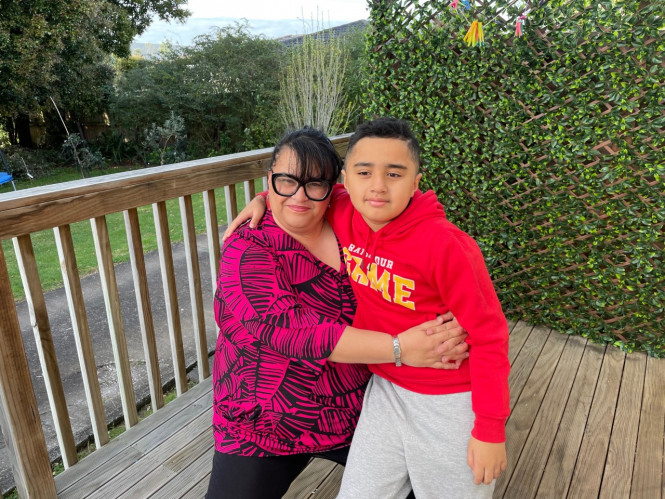
Image credit: Leilani Hoyt and son Hudson, Healthify He Puna Waiora
“My own wellbeing was stretched at times, but taking a break by going for a drive or a walk definitely helped me refuel and recharge,” Leilani says.
“I would drive to Māngere Bridge at least once a week to relax by the water, have my alone time and listen to music. That was me fuelling up and caring for myself and then, when I got home, I would have more energy for family.”
Leilani also started a book club with friends, and they would meet by the water, sit in camping chairs and read in the peace and quiet.
“Connecting with close friends and talking and having a laugh was wonderful. When you’re not feeling okay, having trusted friends supporting you is a gift.”
Extra family time positive
While caring for her family and being self-employed was challenging at times, one of the positives of lockdown for Leilani was being able to spend more quality time with her family.
“We sought the joy in it. With everybody home, it allowed us to hang out and reconnect, which I’m thankful for” she says.
“The lockdowns allowed us to get outside and play and do activities that we wouldn’t have done otherwise. We got to be creative about what activities we could do, which was fun.”
Leilani works on a casual basis for the 360 Tautua Trust teaching people basic computer skills and helping people find work or become work ready. Her job shifted online during the lockdowns.
“Helping others kept my energy lifted in lockdown, and when you’re busy helping others, you become even more grateful for what you have.”
When the family caught COVID-19, they received support from local community organisations.
“A dear friend put my name down for a food parcel and I was so thankful. While I was helping others, we were being helped so it felt like a real village.
“When you’re the recipient of support, it makes you want to give back, so I would always check in on others and make sure they were okay.”
The power of prayer
Leilani says she also found solace in prayer.
“I looked after my spiritual side, and I would talk and write to God and express my feelings and thoughts. Afterwards I felt rejuvenated and motivated to make the most of each day” she says.
“Life can be hard, so for me to be able to talk to God freely and receive peace and comfort from Him really helped me then, and continues to help me now.”
The whole pandemic experience has left Leilani feeling more appreciative of the small things in life.
“After going through the lockdowns and everything that came with it, I’m left with a greater appreciation of people, a greater sense of empathy for others in need and a greater determination to spend my time wisely,” she says.
“Life is short and precious so, for me, taking the time to give and receive love was what got me through.”
Apps
Carer support apps
Mental health and wellbeing apps
References
- Caregiving basics(external link)(external link) Caregiver Action Network, US
- COVID-19 – family, whānau and āiga carers(external link) Health New Zealand | Te Whatu Ora
- Caring for carers during the COVID-19 crisis(external link) Unicef
- Caregiving during COVID-19 – be well with these 6 tips(external link) VITAS healthcare, US
Brochures
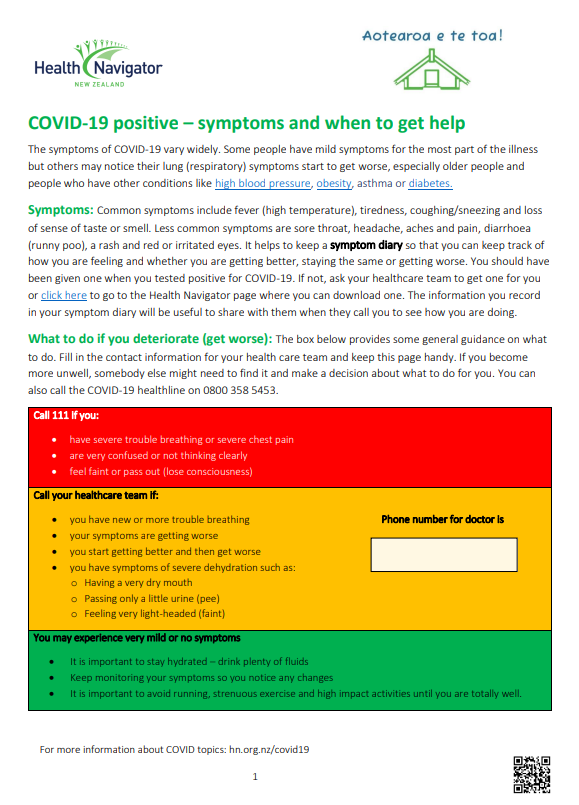
Healthify He Puna Waiora, NZ, 2021
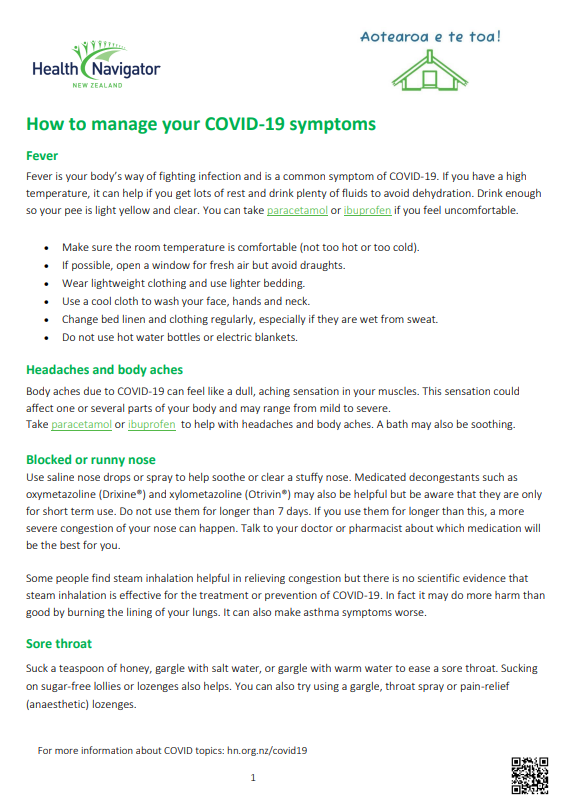
Healthify He Puna Waiora, NZ, 2021
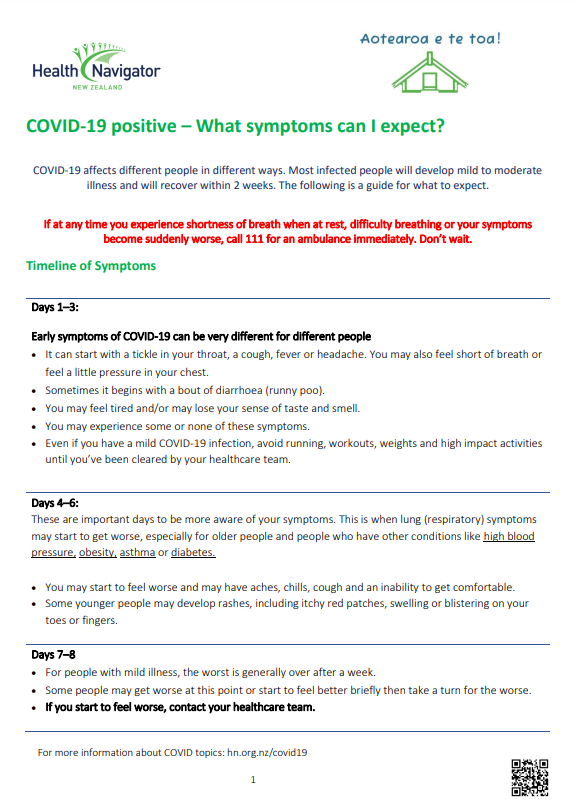
Healthify He Puna Waiora, NZ, 2021
Credits: Healthify editorial team. Healthify is brought to you by Health Navigator Charitable Trust.
Page last updated:





